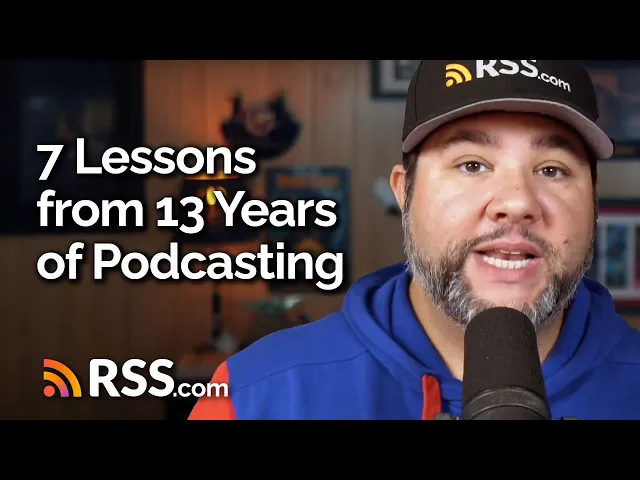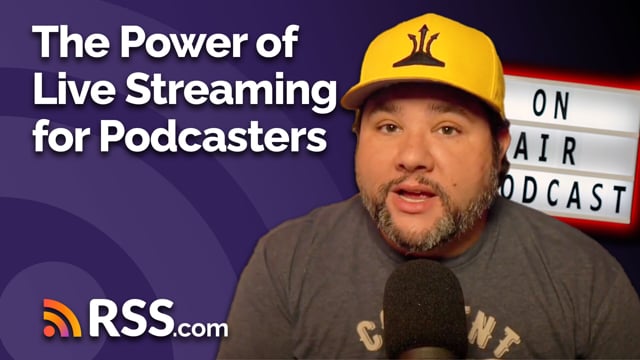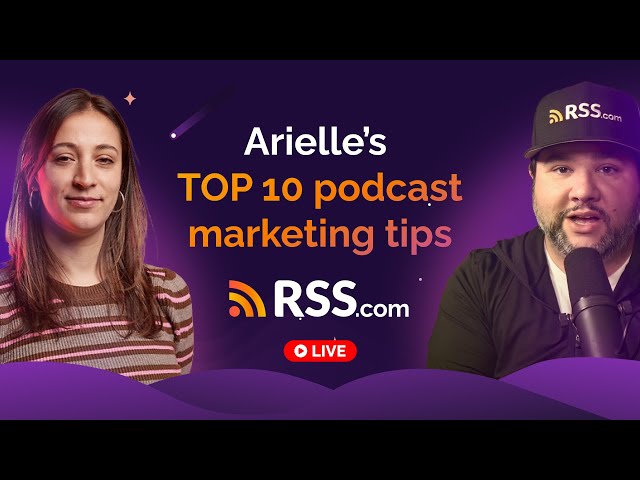RSS.com evangelist Joe Casabona recently shared a video on the RSS.com YouTube channel where he reflected on his 13-year podcasting career and the valuable lessons he’s learned along the way.
As his show approaches its 500th episode milestone, Joe offers advice that every podcaster can benefit from, whether you’re just starting or looking to level up your show.
Watch the full video:
Here are the seven key lessons Joe wishes he’d known when he started podcasting.
1. Have a Single Clear Call to Action
When your listeners are doing laundry, driving, or working out (which research shows 65% of podcast listeners are doing), they’re only half paying attention. That’s why having one clear call to action is critical.
Don’t overwhelm your audience with multiple asks like “subscribe on YouTube, share with a friend, join our mailing list, and check the show notes.” Instead, pick one action you want them to take and repeat it consistently.
Also see: How to Create Effective Calls-To-Action in Your Podcast
2. Build Your Email List from Day One
This is the lesson Joe emphasizes most. Despite working online since high school and podcasting for six years, he didn’t prioritize his email list until 2019. That was a mistake.
Here’s the reality: podcasting creates a parasocial relationship where listeners feel like they know you, but you have no way to reach them directly. Building an email list gives you:
- A direct line to your most engaged listeners
- An easier way to share new episodes and updates
- A monetization avenue for products or services
- An asset you actually own
Make building your email list your primary call to action.
Learn more about why your podcast needs an email list here.
3. Add Transcripts as Soon as Possible
Joe waited three years to add transcripts because AI tools didn’t exist yet and services like Rev charged $1.25 per minute. Once he finally added them, his website traffic increased significantly.
Transcripts make your content more accessible and discoverable. They help people who:
- Can’t listen but want to read the content
- Want to find a specific quote or moment
- Are deaf or hard of hearing
- Prefer scanning content before committing to listen
Today, there’s no excuse not to have transcripts. RSS.com includes free AI transcription on all paid plans, making it easier than ever to add this feature to your show.
Learn more about our podcast transcripts, or watch this video to see how easy it is to add them to your podcast:
4. Hire an Editor
Joe hated editing from the start. It’s time-consuming and difficult to do well. While AI tools can help with basic cuts, there’s a huge difference between removing content and having someone properly master your audio, level everything, and create smooth transitions.
You don’t need to break the bank, but if you’re serious about your podcast (even as a hobby), hiring an editor will save you hours and dramatically improve your sound quality. Joe’s editor has been with him for eight years and has been key to his success.
Recommended reading: Hiring help could help you grow your listener base!
5. Ask Your Guests to Share
Only 25% of podcast guests share the episodes they appear on. That’s a missed opportunity.
The key is doing interviews that stand out. When you ask questions guests haven’t been asked before, they’re much more likely to share the episode with their audience. Make it easy for them by providing shareable assets and links.
Remember: guests want to showcase their expertise, and appearing on your podcast helps them do that. Just make sure you’re creating content worth sharing.
Also see: How to Help Your Guests Promote Your Podcast
6. Experiment with Your Format
For his first 150 episodes, Joe asked the same five questions every time. While this created predictability, it also became monotonous.
When he started experimenting with different formats and questions, he saw downloads increase. More importantly, he saw higher engagement and more people talking about the show.
Think of successful TV shows like House or Law & Order. They have predictable patterns, but they throw in unexpected elements to keep viewers engaged. Your podcast should do the same.
Learn how to pick a format for your show in this quick clip:
7. Downloads Don’t Equal Success
When Joe hit one million downloads within about a year, he launched a $5/month membership with ad-free content, extended episodes, and bonuses. No one signed up.
Why? Because downloads are like foot traffic at a mall. Not everyone who walks in will buy something. What matters is engagement.
Joe now measures success by:
- How many people join his email list
- How many fill out his feedback form
- Direct messages from listeners about specific episodes
His shorter voice note episodes actually get fewer downloads than his interview episodes, but they generate more feedback and engagement, making them more successful by the metrics that matter.
Use downloads as a barometer to see which episodes resonate, but don’t make them your only success metric. Focus on building real connections with your audience.
You really can grow your business with podcasting, Check this out:
Check out our post How to Create a Podcast Business Plan as well for even more tips on growing your business with your show.
Start Growing Your Podcast Today
These seven lessons are timeless because they focus on what really matters: building genuine connections with your audience, making your content accessible, and measuring success by engagement rather than vanity metrics.
Ready to put these lessons into action? Head here to start your podcast for free.
Our platform includes features that support all of these strategies, from automatic transcripts to detailed analytics that go beyond simple download numbers.





